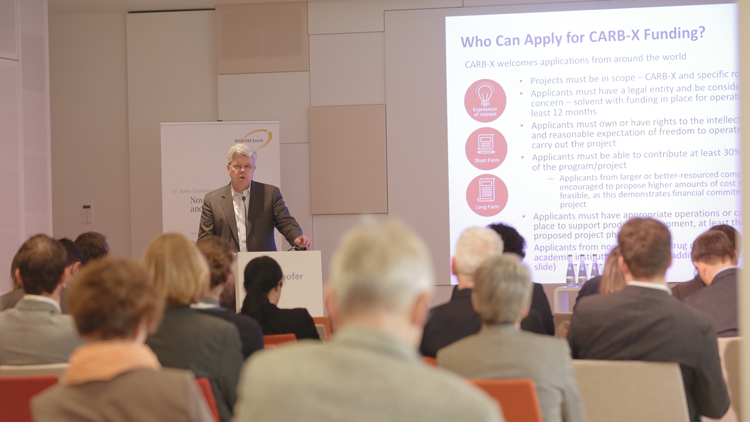
AMR: Germany set to invest €39m into CARB-X
Global antibacterial innovation network CARB-X announced during an AMR business conference in Berlin that Germany has joined the CARB-X partnership.
From 14 to 15 March more than 330 AMR experts are discussing market hurdles and financing challenges for therapeutics and diagnostics developers. During this "Novel Antimicrobials and AMR Diagnostics" conference, global antibacterial innovation network CARB-X announced that Germany has joined the CARB-X partnership. Under the four-year agreement signed earlier this week with the Federal Ministry of Education and Research (BMBF), Germany will invest €39m to incentivise the early development of antibiotics, vaccines, and diagnostics to combat resistance to antimicrobials (AMR).
Germany will provide an additional €1m in direct support to a consortium of the German Center for Infection Research (DZIF, Braunschweig), the Federal Institute for Vaccines and Biomedicines (PEI, Langen) and the Federal Institute for Drugs and Medical Devices (BfArM, Berlin), which is set to join the CARB-X Global Accelerator Network. "The investment in CARB-X is part of an overall €500m R&D budget Germany will contribute in the next 10 years to the fight against antimicrobial resistance," said German Federal Research Minister Anja Karliczek. "I am particularly glad that CARB-X has chosen Germany to host a new CARB-X Accelerator, extending the worldwide network of already existing CARB-X Global Accelerators. Two weeks ago, CARB-X announced it will significantly expand its network of accelerators around the world to support CARB-X funded projects and in order to add scientific expertise to its efforts to fight AMR.
"Drug resistance is one of the most urgent public-health and health-security threats facing the world today. We need political and scientific leadership, vision and sustained effort to win the race against superbugs," said CARB-X Executive Kevin Outersson who said in an interview he was optimistic about the near-time outcome of the network expansion. "The best outcome would be more successful companies moving forward towards the market, with highly innovative antibacterial products," he added.
With the new partnership, CARB-X now has up to €480 million (US$550 million) to help accelerate antibacterial innovation around the world. Launched in 2016, CARB-X funds and supports the world’s largest, most diverse and rapidly growing portfolio of products under development to address serious life-threatening drug resistant bacteria. There are currently 35 projects in the portfolio in six countries. The scope of CARB-X funding is restricted to projects that target drug-resistant bacteria highlighted on the CDC’s 2013 Antibiotic Resistant Threats list, or the Priority Bacterial Pathogens list published by the WHO in 2017.
With the deal, Germany joins CARB-X funders: the Biomedical Advanced Research and Development Authority (BARDA), part of the US Department of Health and Human Services Office of the Assistant Secretary for Preparedness and Response (ASPR), the Wellcome Trust, a global charity based in the UK working to improve health globally, the UK Government’s Global Antimicrobial Resistance Innovation Fund (UK GAMRIF), the Bill & Melinda Gates Foundation, and with in-kind support, the National Institute of Allergy and Infectious Diseases (NIAID), part of the US National Institutes of Health (NIH). "We are delighted to welcome our new partners and accelerator in Germany, BARDA Director Rick Bright, PH.D., said. Together, we can drive the innovation that is so urgently needed to save lives. We encourage other countries and funders to join CARB-X."
Efficient R&D funding for AMR innovators, such as a novel fund targeted to late stage developers to be discussed by the World Health Organization (WHO) or the progress made by Novo’s REPAIR Impact Fund, is just one topic at the 12th Berlin Conference on Life Sciences: Novel Antimicrobials and AMR Diagnostics 2019. FDA and NHS/NICE representatives and the 330+ attendees of the international meeting will also discuss novel reimbursements models, which aim to decouple ROI from the amount of drugs prescribed, urgently needed to incentivise pharma companies to return to antibiotics development. As one of the major partners of the conference, BEAM Alliance is urging policy makers for a call to action towards implementing not only push, but also pull incentives. This includes urgently setting up pilot programs aimed at gaining practical knowledge on utility of the many proposed theoretical incentive models aimed at fixing the current AMR market failure, says Florence Séjourné, President of the BEAM Alliance and CEO of French Da Volterra.
It’s high time to bring Big Pharma back into the field: last year, Novartis and Sanofi quit early AMR research, the latter by outsourcing preclinical assets to the German biotech company Evotec. During the conference in Berlin representatives from Roivant Pharma, for instance, will highlight why they are interested to be active in the AMR space. For the first time, an investor partnering takes place at the event as well. According to the organizers, more than 200 meetings have been pre-scheduled.
For the detailed AMR conference programme see here




